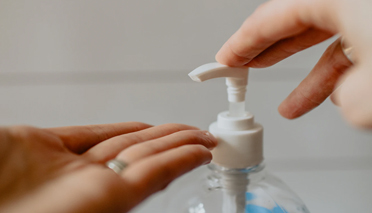CEBD Blog
If you'd like to receive an email when the latest entry is added, please let us know.
Latest entry Thursday 1 September 2022
Read about Dr Lisa Kirby's research on lichen sclerosus and urinary incontinence
23 August 2022
Find out more about the RAPID Eczema Trial starting in September 2022.
26 April 2021
The Dragon In My Skin: book, animation, and resource pack for schools to raise awareness about life with eczema and encourage self-care
Read on the School of Medicine Blog
21 September 2020
We’re really proud of the long standing history that the Centre of Evidence Based Dermatology has in involving patients and carers in our research.
In 2009 we set up a Patient Panel to provide a supportive and sustained link with patients and carers.This is now a well-established group of more than 30 members across the UK, who live with a range of skin conditions.
Panel members contribute to CEBD research in a wide variety of ways and have helped support over 40 projects to date.
The publication of the National Standards for Public Involvement in Research in 2018 gave us an opportunity to reflect on the CEBD Patient Panel and how we work together. An initial consultation with the group, asking them how we measured up against these standards, resulted in the development of an action plan to improve ways of working. This is being delivered by a team made up of both CEBD staff and panel members and some of the changes we’ve introduced are outlined below against the six areas that the national standards cover.

Learning and Support: An induction pack has been developed which six new members have found helpful. A buddying up system has also been put in place to team new members up with more experienced ones as needed. Panel members are now actively involved in planning our annual events and have delivered sessions at meetings to help with shared learning.

Impact: A purpose statement has been developed to ensure a clear message about the aims of the panel.

Inclusive Opportunities: We’ve reached out to the local Young People’s Action Group and BME Centre in Leicester to improve diversity and we are working hard to ensure that all opportunities are advertised widely across the panel.
Communication: Recognised as a strength already due to quarterly update newsletters and the templates used to share involvement opportunities, further improvements have been made including developing an additional ‘we asked, you said, we changed’ template to feedback on how panel input has helped to shape projects.
Panel members have set up a Facebook page to help improve communications between themselves and share information. Due to COVID-19, we are now also exploring remote meetings with the panel which will hopefully enable us to meet more regularly than our past face to face annual events.
Governance: A number of patient panel members are involved in the on-going review and delivery of this action plan to help make sure that the needs of panel member are included in decision making about the direction of the group.
Working Together: A code of conduct has been developed to provide guidance and make expectations clearer for both panel members and researchers.
"Being part of the patient group has been one of the joys of my life. And I was trying to understand why this should be so. It goes without saying that the CEBD do good quality, best practice skin research. The centre really wants to work on a collaborative basis with patients and carers and are genuinely appreciative of the added value which we bring.
Having been part of the patient group since the early days, I am comfortable with the way it works and the lines of communication. Which is why I have been happy to act as a buddy for new members. Joining any new group can be daunting and it helps to feel one has a lifejacket (me) when being thrown in the metaphoric deep end. Although, honestly, the group is such a friendly bunch that my life-saving skills have hardly been tested.
There are over 200 dermatology conditions and whilst the patient group has experience of a broad range of skin problems, it cannot claim to cover all 200 diseases. Health research funding is limited and tends to be directed where it can make most impact. So the more common skin conditions get more of a look in. And this, to a certain extent, dictates the focus of much of the CEBD’s effort. Frustrating for those of us who are less “run-of-the-mill” but there are always universal truths that anybody with a skin condition has to grapple with and therefore always opportunity to engage whatever the project."
Patient panel member Amanda Roberts
‘I would recommend anyone involved in Patient and Public Involvement in research to undertake a review of their activities with the patients and carers that they work with against these national standards. It’s really easy to get complacent about what you’re doing and I feel this review has resulted in some positive changes for how we all work together. We’re continuing with this review on an on-going basis, and the publication of the recent report about the experiences of other research groups and institutions that ‘tested’ these standards has made us realise our efforts are meaningful and worthwhile. We recognise that we still have work to do in some areas such as impact and diversity and will so our best to address these moving forwards. We are always looking for new members to get involved in the panel so if you’re interested in finding out more please get in touch at cebd@nottingham.ac.uk"
Patient Panel co-ordinator Carron Layfield
Date:18 July 2020
Only a few months has passed since our last entry, but it feels an entire world away. We hope everyone is coping well during the current pandemic. Although we intend in covering a number of skin conditions in our blog entries, this one will focus on the impact that coronavirus has had on our work here at the Centre of Evidence Based Dermatology.
Home is where the office is
Until now, our main office was located at the lovely King’s Meadow Campus in Nottingham, but for the time being, it exists virtually. Our clinical colleagues have been re-assigned to the frontline of the NHS, and the rest of the team continue to do the work they always have (albeit our meetings feature more casual clothing and canine companions than they ever did before).
A helping hand…for helping hands
Constant handwashing taking its toll on your skin? You’re not alone –lots of people are finding their hands dry, cracked, red or itchy.
To help Prof Hywel Williams has produced a video, COVID-19 and handwashing advice, which gives practical advice on managing these issues, especially for people who have eczema and dry skin.
This information has led to changes in advice from the British Association of Dermatologists and patient organisations to support hand washing with soap, followed by emollient use.

Soap, skin and coronavirus; therein lies the rub.
Scratching the surface of COVID-19
So much work is being done internationally to learn more about the coronavirus – it can be difficult to keep up, even for those of us focused mainly on the skin. You will probably have seen news stories about changes to the skin that can occur if you have the virus, but alongside this are the effects of wearing personal protective equipment on the skin, how the virus can affect people with specific types of skin conditions (and those on immune modulating treatments), and changes in the way dermatology services are delivered.
Fortunately, our information specialist has created a fantastic CEBD coronavirus resource that is regularly updated with new information on all of the above topics. This is helping people to identify relevant evidence quickly and has proven to be very popular with over 5,000 views.
And finally… any questions?
The Nottingham Support Group for Carers of Children with Eczema (NSGCCE) is working on answering your questions about the coronavirus. The Eczema and COVID-19: Questions and answers webpage includes queries such as whether the virus could cause eczema to flare, and what to do when a child with facial eczema keeps touching their face.
Date: 24 Feb 2020
We’ve decided to create a CEBD blog to share stories about our research, or research being done by others for skin conditions. This will also replace our e-patient newsletter.
BEEP BEEP! – Move over for results of the BEEP eczema prevention trial
The 19th of February was an exciting day for us as the BEEP study results were published in The Lancet. The BEEP study was testing whether using moisturisers on newborn babies during the first year of life can prevent eczema from developing.
We found that the moisturisers didn’t make a difference to eczema development in the babies. However, there was a small increase in the risk of skin infections and a hint that the daily use of moisturisers might increase the risk of food allergies.
 He may be tiny, but he's already part of a groundbreaking research study.
He may be tiny, but he's already part of a groundbreaking research study.
Actually, another research team looking at eczema prevention had the results of their study, PreventADALL, published at the same time as ours. Their study, involving families in Norway and Sweden, also looked at whether using emollients could prevent eczema, and additionally, early weaning with common food allergens (peanuts, egg, milk, wheat). Their results also showed moisturisers didn’t make a difference to eczema development, nor did the early introduction of certain foods during weaning.
The results are disappointing, as we were hopeful that this research would show that eczema could be prevented, but at least the research shows that families do not need to use moisturisers from birth in the hope of preventing eczema developing. We’re now sharing the results with the national and international community, so the research can help as many people as possible.
Another thing to remember is that the BEEP study isn’t finished yet; although these results show that using daily moisturiser didn’t make a difference to eczema development at 2 years of age, it might make a difference when the children are slightly older – so we’ll be keeping in touch with them until all the children have reached their 5th birthday.
There's an app for that! (but do the skin cancer detections ones work?)
It seems there are apps available for everything - including ones which say they can 'detect' skin cancer. So, working with researchers from the University of Birmingham, these apps were put to the test and the findings published in the British Medical Journal. The results showed that these apps are unreliable.
"Although I was broad minded on the potential benefit of apps for diagnosing skin cancer, I am now worried given the results of our study and the overall poor quality of studies used to test these apps. My advice to anyone worried about a possible skin cancer is “if in doubt, check it out with your GP."
- Prof. Hywel Williams, CEBD
Working with the press office at the university, a story has been written to highlight the problems with these apps, and it has appeared in newspapers across the world. We're really pleased to see this information is reaching so many people in a variety of ways - Hywel was even invited onto BBC radio Nottingham to talk about the results!
Seeking views on rare blistering skin diseases
It must seem like we’re always asking for help with surveys - but that’s because they’re a really good way of finding out about people affected by skin conditions (and those who treat them) and their thoughts and experiences.
Take for example the Pemphigus and Pemphigoid Diseases survey - this is seeking views from people with these conditions, and healthcare professionals, to make sure that future research into the treatment options is focused on the most important questions.
What’s next on the research front?
They say it’s good to have something to look forward to, and we certainly have that - the results of our HI-light vitiligo study will be published in the near future. We can’t say much more about it right now, but watch this space!